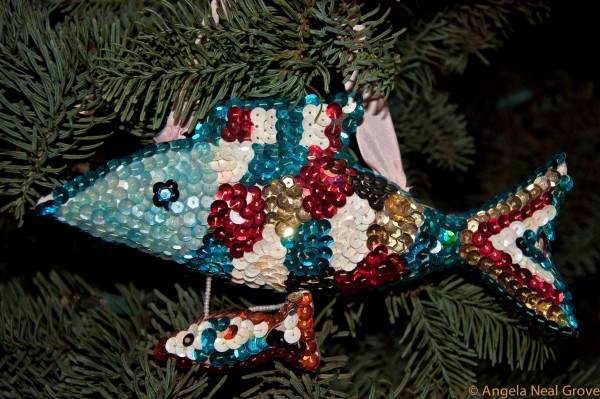 A fish decorates our Christmas tree every year. About six inches long, covered in blue, red, gold and white sequins, it has a smaller fish hanging from its belly. We bought the fish in Sidi Bouzid, Tunisia, on a family vacation. (I began collecting small handcrafted items for the tree after returning from Burma with six gold-foil wrapped owls). Always on the lookout for a small souvenir to bring home, we saw the fish in a window. It was a bridal shop, and the fish with its tiny baby a traditional fertility gift.
A fish decorates our Christmas tree every year. About six inches long, covered in blue, red, gold and white sequins, it has a smaller fish hanging from its belly. We bought the fish in Sidi Bouzid, Tunisia, on a family vacation. (I began collecting small handcrafted items for the tree after returning from Burma with six gold-foil wrapped owls). Always on the lookout for a small souvenir to bring home, we saw the fish in a window. It was a bridal shop, and the fish with its tiny baby a traditional fertility gift.
The fish nestled among successive branches for years, a fond memory of a hilltop town with views of the blue Mediterranean far below. Memories of cobbled streets lined with white-washed buildings, and shops selling birdcages for which it was famous. A wonderful summer holiday with Charles, Charlotte and Victoria.
Until this year. As I unwrapped the collection, the idyllic memories were replaced by the realisation that it was in this town that the revolutions of 2011 began. In December 2010 Mohamed Bouazizi, a street fruit vendor, made the ultimate sacrifice when his fruit was seized by police, after he refused to pay a bribe.
What followed was the topple of corrupt regimes – dubbed the Arab Spring.
I hung the fish on the tree among my treasures from other countries. The bells from Cambodia made by local women from melted shell-casings and hung on buffalo bridles. Handblown glass ovals from Egypt brought thoughts of another country in turmoil. Though in Burma, origin of my six owls which began the tradition, news is more hopeful.
Once again the tree became central to our holiday celebrations. On its branches ornaments from over fifty-two countries hang together. A collective wish for ever elusive international peace. TTFN